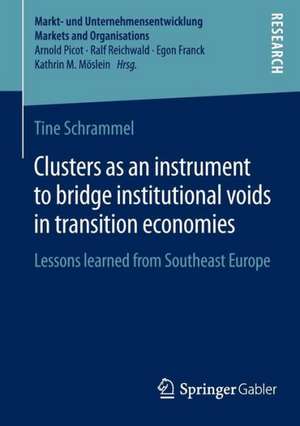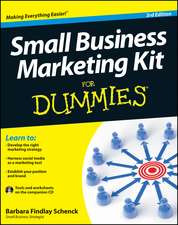Clusters as an instrument to bridge institutional voids in transition economies: Lessons learned from Southeast Europe: Markt- und Unternehmensentwicklung Markets and Organisations
Autor Tine Schrammelen Limba Engleză Paperback – 7 mai 2014
Din seria Markt- und Unternehmensentwicklung Markets and Organisations
- 15%
 Preț: 467.46 lei
Preț: 467.46 lei -
 Preț: 486.21 lei
Preț: 486.21 lei -
 Preț: 359.64 lei
Preț: 359.64 lei - 15%
 Preț: 438.54 lei
Preț: 438.54 lei -
 Preț: 385.62 lei
Preț: 385.62 lei -
 Preț: 450.33 lei
Preț: 450.33 lei -
 Preț: 446.08 lei
Preț: 446.08 lei - 13%
 Preț: 381.58 lei
Preț: 381.58 lei - 15%
 Preț: 438.07 lei
Preț: 438.07 lei - 15%
 Preț: 440.21 lei
Preț: 440.21 lei -
 Preț: 388.52 lei
Preț: 388.52 lei -
 Preț: 378.54 lei
Preț: 378.54 lei - 15%
 Preț: 439.70 lei
Preț: 439.70 lei -
 Preț: 418.07 lei
Preț: 418.07 lei -
 Preț: 415.18 lei
Preț: 415.18 lei -
 Preț: 482.17 lei
Preț: 482.17 lei -
 Preț: 448.76 lei
Preț: 448.76 lei - 15%
 Preț: 468.90 lei
Preț: 468.90 lei - 13%
 Preț: 384.50 lei
Preț: 384.50 lei - 15%
 Preț: 446.41 lei
Preț: 446.41 lei -
 Preț: 382.18 lei
Preț: 382.18 lei - 15%
 Preț: 644.18 lei
Preț: 644.18 lei -
 Preț: 419.43 lei
Preț: 419.43 lei -
 Preț: 379.48 lei
Preț: 379.48 lei - 13%
 Preț: 377.03 lei
Preț: 377.03 lei -
 Preț: 383.93 lei
Preț: 383.93 lei -
 Preț: 384.09 lei
Preț: 384.09 lei -
 Preț: 488.71 lei
Preț: 488.71 lei - 15%
 Preț: 446.92 lei
Preț: 446.92 lei -
 Preț: 459.00 lei
Preț: 459.00 lei -
 Preț: 414.65 lei
Preț: 414.65 lei - 15%
 Preț: 444.29 lei
Preț: 444.29 lei - 15%
 Preț: 466.13 lei
Preț: 466.13 lei - 15%
 Preț: 438.54 lei
Preț: 438.54 lei - 15%
 Preț: 437.25 lei
Preț: 437.25 lei - 13%
 Preț: 375.33 lei
Preț: 375.33 lei -
 Preț: 480.06 lei
Preț: 480.06 lei -
 Preț: 453.21 lei
Preț: 453.21 lei - 15%
 Preț: 468.12 lei
Preț: 468.12 lei -
 Preț: 450.49 lei
Preț: 450.49 lei -
 Preț: 482.94 lei
Preț: 482.94 lei - 15%
 Preț: 440.86 lei
Preț: 440.86 lei - 15%
 Preț: 466.78 lei
Preț: 466.78 lei -
 Preț: 381.00 lei
Preț: 381.00 lei -
 Preț: 447.62 lei
Preț: 447.62 lei - 15%
 Preț: 442.17 lei
Preț: 442.17 lei - 15%
 Preț: 528.48 lei
Preț: 528.48 lei - 15%
 Preț: 475.47 lei
Preț: 475.47 lei - 15%
 Preț: 440.21 lei
Preț: 440.21 lei -
 Preț: 385.84 lei
Preț: 385.84 lei
Preț: 386.22 lei
Nou
Puncte Express: 579
Preț estimativ în valută:
73.93€ • 80.33$ • 62.14£
73.93€ • 80.33$ • 62.14£
Carte tipărită la comandă
Livrare economică 21 aprilie-05 mai
Preluare comenzi: 021 569.72.76
Specificații
ISBN-13: 9783658057244
ISBN-10: 3658057246
Pagini: 283
Ilustrații: XV, 267 p. 21 illus.
Dimensiuni: 148 x 210 x 17 mm
Greutate: 0.37 kg
Ediția:2014
Editura: Springer Fachmedien Wiesbaden
Colecția Springer Gabler
Seria Markt- und Unternehmensentwicklung Markets and Organisations
Locul publicării:Wiesbaden, Germany
ISBN-10: 3658057246
Pagini: 283
Ilustrații: XV, 267 p. 21 illus.
Dimensiuni: 148 x 210 x 17 mm
Greutate: 0.37 kg
Ediția:2014
Editura: Springer Fachmedien Wiesbaden
Colecția Springer Gabler
Seria Markt- und Unternehmensentwicklung Markets and Organisations
Locul publicării:Wiesbaden, Germany
Public țintă
ResearchCuprins
Environments of institutional voids.- Case studies from Southeast Europe.- Cluster support.
Notă biografică
Tine Schrammel received her PhD from the University of Passau, where she was affiliated with the Chair of International Management (Prof. Dr. Carola Jungwirth). She worked for development cooperation in Southeast Europe.
Textul de pe ultima copertă
Transition economies, such as the countries in Southeast Europe, face an expeditious institutional transition from a centrally planned to a market economy. The state withdraws from its monitoring function, which results in institutional voids that affect the economy in general and small and medium sized enterprises (SMEs) in specific. With a qualitative case study approach Tine Schrammel develops a scheme to detect institutional voids as one source of competitive disadvantages of SMEs in transition economies. In a second step she demonstrates that specific cluster services bridge institutional voids and improve the competitive position of SMEs in environments of institutional voids. The findings add to the understanding of institutional voids and to the role of clusters in transition economies.
Contents
Tine Schrammel received her PhD from the University of Passau, where she was affiliated with the Chair of International Management (Prof. Dr. Carola Jungwirth). She worked for development cooperation in Southeast Europe.
Contents
- Environments of institutional voids
- Case studies from Southeast Europe
- Cluster support
- Lecturers and students of business administration with focus on international management, regional development and development cooperation
- Cluster Managers, Policy Makers, and SMEs from and entering into Southeast Europe
Tine Schrammel received her PhD from the University of Passau, where she was affiliated with the Chair of International Management (Prof. Dr. Carola Jungwirth). She worked for development cooperation in Southeast Europe.
Caracteristici
Publication in the field of economic sciences Includes supplementary material: sn.pub/extras











